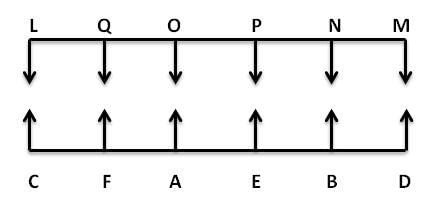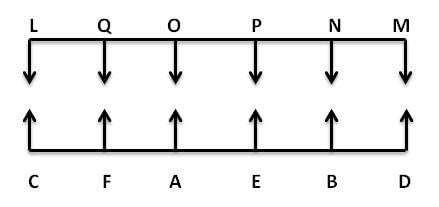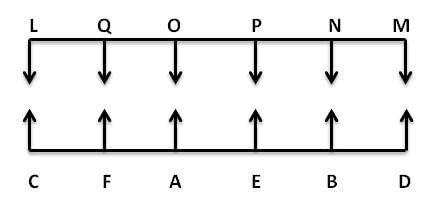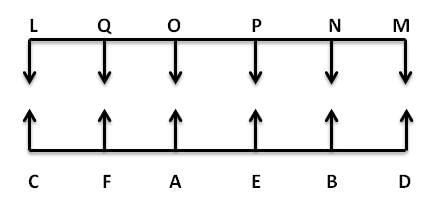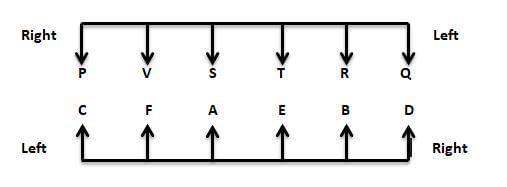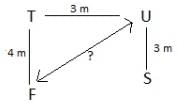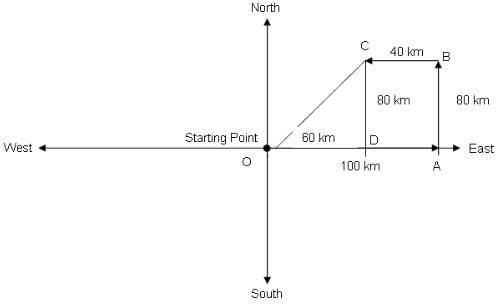Dena Bank PO Mock Test - 10 - Bank Exams MCQ
30 Questions MCQ Test - Dena Bank PO Mock Test - 10
In each of the following questions two statements are given. Which are followed by four conclusions (1), (2), (3) and (4). Choose the conclusions which logically follow from the given statements.
Q.
Statements: No door is dog. All the dogs are cats.
Conclusions:
- No door is cat.
- No cat is door.
- Some cats are dogs.
- All the cats are dogs.
Statements: All green are blue. All blue are white.
Conclusions:
- Some blue are green.
- Some white are green.
- Some green are not white.
- All white are blue.
Statements: All men are vertebrates. Some mammals are vertebrates.
Conclusions:
- All men are mammals.
- All mammals are men.
- Some vertebrates are mammals.
- All vertebrates are men.
Statements: All the phones are scales. All the scales are calculators.
Conclusions:
- All the calculators are scales.
- All the phones are calculators
- All the scales are phones.
- Some calculators are phones.
Statements: Some tables are T.V. Some T.V. are radios.
Conclusions:
- Some tables are radios.
- Some radios are tables.
- All the radios are T.V.
- All the T.V. are tables.
Directions to Solve
In each word of the following questions consists of pair of words bearing a relationship among these, from amongst the alternatives, pick up the pair that best illustrate a similar relationship.
Question -
Scales : Fish
Directions to Solve
In each word of the following questions consists of pair of words bearing a relationship among these, from amongst the alternatives, pick up the pair that best illustrate a similar relationship.
Question -
Numismatist : Coins
Directions to Solve: In each of the questions below consists of a question and two statements numbered I and II given below it. You have to decide whether the data provided in the statements are sufficient to answer the question. Read both the statements and
Give answer:
- (A) If the data in statement I alone are sufficient to answer the question, while the data in statement II alone are not sufficient to answer the question
- (B) If the data in statement II alone are sufficient to answer the question, while the data in statement I alone are not sufficient to answer the question
- (C) If the data either in statement I alone or in statement II alone are sufficient to answer the question
- (D) If the data given in both statements I and II together are not sufficient to answer the question and
- (E) If the data in both statements I and II together are necessary to answer the question.
Question: Among T, V, B, E and C, who is the third from the top when arranged in the descending order of their weights ?
Statements:
I.B is heavier than T and C and is less heavier than V who is not the heaviest.
II.C is heavier than only T.
Directions to Solve: In each of the questions below consists of a question and two statements numbered I and II given below it. You have to decide whether the data provided in the statements are sufficient to answer the question. Read both the statements and
Give answer:
- (A) If the data in statement I alone are sufficient to answer the question, while the data in statement II alone are not sufficient to answer the question
- (B) If the data in statement II alone are sufficient to answer the question, while the data in statement I alone are not sufficient to answer the question
- (C) If the data either in statement I alone or in statement II alone are sufficient to answer the question
- (D) If the data given in both statements I and II together are not sufficient to answer the question and
- (E) If the data in both statements I and II together are necessary to answer the question.
Question: Which word in the code language means 'flower' ?
Statements:
I.'de fu la pane' means 'rose flower is beautiful' and 'la quiz' means 'beautiful tree'.
II.'de la chin' means 'red rose flower' and 'pa chin' means 'red tea'.
Directions to Solve: In each of the questions below consists of a question and two statements numbered I and II given below it. You have to decide whether the data provided in the statements are sufficient to answer the question. Read both the statements and
Give answer:
- (A) If the data in statement I alone are sufficient to answer the question, while the data in statement II alone are not sufficient to answer the question
- (B) If the data in statement II alone are sufficient to answer the question, while the data in statement I alone are not sufficient to answer the question
- (C) If the data either in statement I alone or in statement II alone are sufficient to answer the question
- (D) If the data given in both statements I and II together are not sufficient to answer the question and
- (E) If the data in both statements I and II together are necessary to answer the question.
Question: Who is C's partner in a game of cards involving four players A, B, C and D ?
Statements:
I.D is sitting opposite to A.
II.B is sitting right of A and left of D.
Directions to Solve: In each of the questions below consists of a question and two statements numbered I and II given below it. You have to decide whether the data provided in the statements are sufficient to answer the question. Read both the statements and
Give answer:
- (A) If the data in statement I alone are sufficient to answer the question, while the data in statement II alone are not sufficient to answer the question
- (B) If the data in statement II alone are sufficient to answer the question, while the data in statement I alone are not sufficient to answer the question
- (C) If the data either in statement I alone or in statement II alone are sufficient to answer the question
- (D) If the data given in both statements I and II together are not sufficient to answer the question and
- (E) If the data in both statements I and II together are necessary to answer the question.
Question: How many students in a class play football ?
Statements:
I.Only boys play football.
II.There are forty boys and thirty girls in the class.
Directions to Solve: In each of the questions below consists of a question and two statements numbered I and II given below it. You have to decide whether the data provided in the statements are sufficient to answer the question. Read both the statements and
Give answer:
- (A) If the data in statement I alone are sufficient to answer the question, while the data in statement II alone are not sufficient to answer the question
- (B) If the data in statement II alone are sufficient to answer the question, while the data in statement I alone are not sufficient to answer the question
- (C) If the data either in statement I alone or in statement II alone are sufficient to answer the question
- (D) If the data given in both statements I and II together are not sufficient to answer the question and
- (E) If the data in both statements I and II together are necessary to answer the question.
Question: On a T.V. channel, four serials A, B, C, and D were screened, one on eacn days, on four consecutive days but not necessarily in that order. On which day was serial C screened?
Statements:
I. The first serial was screened on 23rd, Tuesday and was followed by serial D.
II. Serial A was not screened on 25th and one serial was screened between serials A and B.
If M x N means M is the daughter of N; M + N means M is the father of N; M % N means M is the mother of N and M - N means M is the brother of N then P % Q + R - T x K indicates which relation of P to K?
If P + Q means P is the brother of Q; P x Q means P is the father of Q and P - Q means P is the sister of Q, which of the following relations shows that I is the niece of K?
Pointing towards a girl, Abhisek says, "This girl is the daughter of only a child of my father." What is the relation of Abhisek's wife to that girl?
If A $ B means B is the father of A; A # B means B is the mother of A; A * B means B is the sister of A and A @ B means B is the husband of A, which of the following indicates that N is the grandmother of P?
Anupam said to a lady sitting in a car, "The only daughter of the brother of my wife is the sister-in-law of the brother of your sister." How the husband of the lady is related to Anupam?
Directions: Study the following information to answer the given questions
Twelve people are sitting in two parallel rows containing six people each, in such a way that there is an equal distance between adjacent persons. In row-1 L, M, N, O, P and Q are seated and all of them are facing South. In row-2 A, B, C, D, E and F are seated and all of them are facing North. Therefore, in the given seating arrangement each member seated in a row faces another member of the other row. O sits third to right of M. Either O or M sits at an extreme end of the line. The one who faces M sits second to right of E. Two people sit between B and F. Neither B nor F sits at an extreme end of the line. The immediate neighbor of B faces the person who sits third to left of L. N and P are immediate neighbors of each other. C sits second to the left of A. P does not face the immediate neighbor of D.
Q. Who amongst the following sit at extreme ends of the rows?
Directions: Study the following information to answer the given questions
Twelve people are sitting in two parallel rows containing six people each, in such a way that there is an equal distance between adjacent persons. In row-1 L, M, N, O, P and Q are seated and all of them are facing South. In row-2 A, B, C, D, E and F are seated and all of them are facing North. Therefore, in the given seating arrangement each member seated in a row faces another member of the other row. O sits third to right of M. Either O or M sits at an extreme end of the line. The one who faces M sits second to right of E. Two people sit between B and F. Neither B nor F sits at an extreme end of the line. The immediate neighbor of B faces the person who sits third to left of L. N and P are immediate neighbors of each other. C sits second to the left of A. P does not face the immediate neighbor of D.
Q. How many persons are seated between Q and N?
Directions: Study the following information to answer the given questions
Twelve people are sitting in two parallel rows containing six people each, in such a way that there is an equal distance between adjacent persons. In row-1 L, M, N, O, P and Q are seated and all of them are facing South. In row-2 A, B, C, D, E and F are seated and all of them are facing North. Therefore, in the given seating arrangement each member seated in a row faces another member of the other row. O sits third to right of M. Either O or M sits at an extreme end of the line. The one who faces M sits second to right of E. Two people sit between B and F. Neither B nor F sits at an extreme end of the line. The immediate neighbor of B faces the person who sits third to left of L. N and P are immediate neighbors of each other. C sits second to the left of A. P does not face the immediate neighbor of D.
Q. L is related to A in the same way as O is related to B based on the given arrangement. To which of the following is P related to, following the same pattern?
Directions: Study the following information to answer the given questions
Twelve people are sitting in two parallel rows containing six people each, in such a way that there is an equal distance between adjacent persons. In row-1 L, M, N, O, P and Q are seated and all of them are facing South. In row-2 A, B, C, D, E and F are seated and all of them are facing North. Therefore, in the given seating arrangement each member seated in a row faces another member of the other row. O sits third to right of M. Either O or M sits at an extreme end of the line. The one who faces M sits second to right of E. Two people sit between B and F. Neither B nor F sits at an extreme end of the line. The immediate neighbor of B faces the person who sits third to left of L. N and P are immediate neighbors of each other. C sits second to the left of A. P does not face the immediate neighbor of D.
Q. Which of the following is true regarding P?
Directions: Read the following information carefully and answer the questions.
Twelve people are sitting in two parallel rows containing six people each, in such a way that there is an equal distance between adjacent persons. In row-1 P, Q, R, S, T and V are seated and all of them are facing South. In row-2 A, B, C, D, E and F are seated and all of them are facing North. Therefore, in the given seating arrangement each member seated in a row faces another member of the other row. S sits third to right of Q. Either S or Q sits at an extreme end of the line. The one who faces Q sits second to right of E. Two people sit between B and F. Neither B nor F sits at an extreme end of the line. The immediate neighbor of B faces the person who sits third to left of P. R and T are immediate neighbors of each other. C sits second to the left of A. T does not face the immediate neighbor of D.
Q. P is related to A in the same way as S is related to B based on the given arrangement. To which of the following is T related to, following the same pattern?
Directions: Read the following information carefully and answer the question given below.
A * B means A is to the left of B at a distance of 2 m.
A & B means A is to the west of B at a distance of 3 m.
A © B means A is to the south of B at a distance of 4 m.
A £ B means A is to the north of B at a distance of 3 m.
It is given that all the persons face north.
Q. If we have F © T & U £ S, then how far is U from F?
Rocky drives a car in the east direction and covers 100 km. Then he takes a turn and moves 80 km in the north direction. After that, he takes a left turn and covers 40 km, and reaches his destination. How much distance is he away from the starting position?
Directions: Study the given information and answer the following question.
In a certain code language:
'play books during winters' is coded as 9@h 16@h 26#b 13#t.
'apples look red blink' is coded as 22@w 12#p 22#h 13@p.
'study novels wrist luck' is coded as 8@g 15#h 23@b 24#p.
'chairs doors blue right' is coded as 19@g 6#v 9#h 9@h.
Q. Using the given rules, find the code for 'student perfect'.
Directions: Study the given information and answer the following question.
In a certain code language:
'play books during winters' is coded as 9@h 16@h 26#b 13#t.
'apples look red blink' is coded as 22@w 12#p 22#h 13@p.
'study novels wrist luck' is coded as 8@g 15#h 23@b 24#p.
'chairs doors blue right' is coded as 19@g 6#v 9#h 9@h.
Q. What will be the code for 'am' in this code language?
Directions: Study the given information and answer the following question.
In a certain code language:
'play books during winters' is coded as 9@h 16@h 26#b 13#t.
'apples look red blink' is coded as 22@w 12#p 22#h 13@p.
'study novels wrist luck' is coded as 8@g 15#h 23@b 24#p.
'chairs doors blue right' is coded as 19@g 6#v 9#h 9@h.
Q. What does the code 12@m 26@b 9@h represent?
Directions: Study the following information carefully and answer the question given below it.
A word and number arrangement machine, when given an input line of words and numbers, rearranges them following a particular rule in each step. The following is an illustration of an input and the rearrangement:
Input: past back 32 47 19 own fear 25
Step I: 19 past back 32 47 own fear 25
Step II: 19 past 25 back 32 47 own fear
Step III: 19 past 25 own back 32 47 fear
Step IV: 19 past 25 own 32 back 47 fear
Step V: 19 past 25 own 32 fear back 47
Step VI: 19 past 25 own 32 fear 47 back
Step VI is the last step.
As per the rules followed in the above steps, find out the appropriate step for the given input.
Input: judge retire home 62 53 41 34 task
Q. How many steps will be required to complete the arrangement?
Directions: Study the following information carefully and answer the question given below it.
A word and number arrangement machine, when given an input line of words and numbers, rearranges them following a particular rule in each step. The following is an illustration of an input and the rearrangement:
Input: past back 32 47 19 own fear 25
Step I: 19 past back 32 47 own fear 25
Step II: 19 past 25 back 32 47 own fear
Step III: 19 past 25 own back 32 47 fear
Step IV: 19 past 25 own 32 back 47 fear
Step V: 19 past 25 own 32 fear back 47
Step VI: 19 past 25 own 32 fear 47 back
Step VI is the last step.
As per the rules followed in the above steps, find out the appropriate step for the given input.
Step II of an input is: 27 ultra open case 45 35 now 12
Q. Which of the following is definitely the input?
Directions: Read the passage and answer the questions that follow:
Development is about expanding the capabilities of the disadvantaged, thereby improving their overall quality of life. Based on this understanding, Maharashtra, one of India’s richest States, is a classic case of a lack of development which is seen in its unacceptably high level of malnutrition among children in the tribal belts. While the State’s per capita income has doubled since 2004, its nutritional status has not made commensurate progress.
Poor nutrition security disproportionately affects the poorest segment of the population. According to NFHS 2015-16, every second tribal child suffers from growth restricting malnutrition due to chronic hunger. In 2005, child malnutrition claimed as many as 718 lives in Maharashtra’s Palghar district alone. Even after a decade of double digit economic growth (2004-05 to 2014-15), Palghar’s malnutrition status has barely improved.
In September 2016, the National Human Rights Commission issued notice to the Maharashtra government over reports of 600 children dying due to malnutrition in Palghar. The government responded, promising to properly implement schemes such as Jaccha Baccha and Integrated Child Development Services to check malnutrition. Our independent survey conducted in Vikramgad block of the district last year found that 57%, 21% and 53% of children in this block were stunted, wasted and underweight, respectively; 27% were severely stunted. Our data challenges what Maharashtra’s Women and Child Development Minister said in the Legislative Council in March — that “malnutrition in Palghar had come down in the past few months, owing to various interventions made by the government.”
Stunting is caused by an insufficient intake of macro- and micro-nutrients. It is generally accepted that recovery from growth retardation after two years is only possible if the affected child is put on a diet that is adequate in nutrient requirements. A critical aspect of nutrient adequacy is diet diversity, calculated by different groupings of foods consumed with the reference period ranging from one to 15 days. We calculated a 24-hour dietary diversity score by counting the number of food groups the child received in the last 24 hours. The eight food groups include: cereals, roots and tubers; legumes and nuts; dairy products; flesh foods; eggs; fish; dark green leafy vegetables; and other fruits and vegetables.
In most households it was rice and dal which was cooked most often and eaten thrice a day. These were even served at teatime to the children if they felt hungry. There was no milk, milk product or fruit in their daily diets. Even the adults drank black tea as milk was unaffordable. Only 17% of the children achieved a minimum level of diet diversity — they received four or more of the eight food groups. This low dietary diversity is a proxy indicator for the household’s food security too as the children ate the same food cooked for adult members.
Q. Which of the following is/are true as per the passage?
I. India’s situation is worse than in some of the world’s poorest countries — Bangladesh, Afghanistan or Mozambique.
II. Development is more than just economic growth.
III. On an average, the nutrition expenditure as a percentage of the Budget has drastically declined from 1.68% in 2012-13 to 0.94% in 2018-19.



